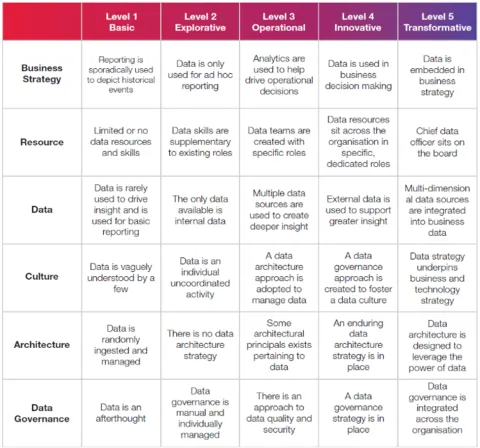The maturity of your organisation’s approach to managing and controlling its data is fundamental to making effective business decisions. With a grounded understanding of your current capability, you can better inform the tools, methods, and ultimately the people you should deploy to truly harness the power of your data.
A comprehensive data maturity assessment is an enlightening, introspective exercise enabling you to use data as one of the essential tools to help make important business decisions with confidence. Although understanding your data capability might seem like a daunting task (without a structured, coordinated plan, it often can be), this blog outlines the benefits and value of using a maturity assessment approach as your baseline to create a strong and strategic data roadmap.
Defining your current maturity level
One common challenge is a lack of strategic alignment between your data offering and the aims, objectives and key business questions that your organisation is trying to answer. Without a clear vision or strategic objective, data can quickly become an overhead that produces monthly, historical reporting rather than adding real value. Furthermore, organisations can easily become distracted and confused when relying on out of date, retrospective reporting, which hampers decision-making capability.
Data isn’t a “silver bullet”, but it is one of several tools required to understand and address your business challenges. Assessing your organisation’s current maturity level is therefore a significant first step to help define a cost effective, manageable roadmap to achieve your desired data strategy.
A true understanding of your baseline position will kick-start a new conversation focused on targeted, achievable improvements. It also highlights where risks may be involved such as skills gaps, over-fitting expensive resources with no outcome-based benefits, and the expensive costs associated with storing and paying to manage potentially valueless data.
Demystifying your data
At first, well respected data methodologies such as DAMA’s approach to data management1 (shown in the diagram) may appear complex and expensive. But with years of research, these approaches hold significant potential.
Understanding globally recognised approaches to governing and managing data isn’t something only large-scale corporates can achieve. When approached to meet the unique needs of your organisation, a light touch assessment can provide start-ups and third sector organisations with significant benefits and outcomes.
In many cases, you don’t need to take on the “whole challenge”, but break it down into manageable, suitable assessments that offer targeted outcomes. In which case, a mix and match assessment approach will help your organisation target its challenges of the moment without significant investment. Fundamentally, this approach allows you to understand key elements of your current capability, and highlights opportunities for your existing people, processes and technologies to create low cost, low complexity data-driven benefits.
Managing your existing data
A common trap organisations fall into is to assume the latest trend in data, platforms or tooling is the best solution for their data aspirations. This isn’t always the case, and often, considering a legacy approach to data using existing platforms and tooling is the first stage to defining an organisation’s short to medium term opportunities.
A platform and tooling agnostic approach helps you focus on what is actually required to achieve your immediate objectives, and validates the benefits of your existing capability before considering alternative solutions as part of a tailored data journey.
Defining and analysing the way your data is architected, ingested, created, stored, accessed and used is pivotal to this process. And a robust and clear data strategy doesn’t necessarily mean keeping every bit of data available, so a simple assessment can also help you quickly identify instant cost savings!
As part of this process, there are many considerations:
- Who has access to your data?
- What is their role within your business?
- Do they require enduring access to your data?
- How secure is your data?
- What is the quality of your data?
- How is your data being used to answer key business questions and inform decision making?
These key questions should be answered prior to employing skilled data specialists, as a crucial step in your maturity assessment is to understand which people you actually need in order to effectively harness your data.
Having defined how, where, and why your data is stored, you should consider what processes and policies are in place to govern it. A maturity assessment will identify any gaps in your procedures, whether they are in line with industry best practices, and if they are fit for your organisation’s maturity stage.
We’re here to help
CGI’s Data Advisory team partners with organisations to help guide, support and drive effective data strategies. We have experience across all aspects of data maturity, whether that is defining current business processes and aligning to a new data component, or mapping disparate data sources to a common architecture, we will create a maturity assessment that fits your organisation’s needs. Our approach to data maturity is highlighted in this diagram.
Our tried and tested method for transformational data strategies will drive your specific strategic objectives, and using our collaboration approach, we will bolster organisational and cultural commitment from senior to employee level.
If you’d like to find out more about what a data transformation partnership with CGI might look like, take a look at our data journey brochure or please reach out to me.









